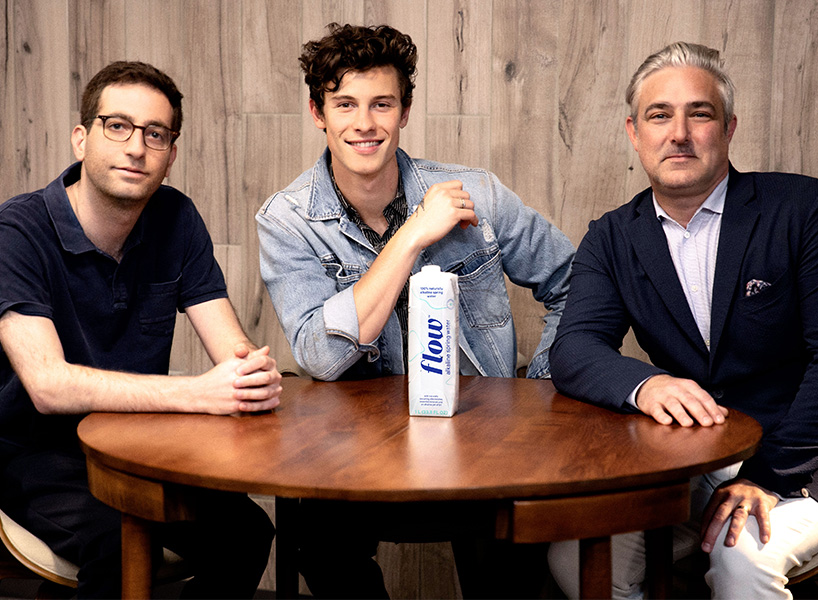Shawn Mendes’s New Role as a “Sustainability Ambassador” Is Kinda BS
We love an eco-conscious heartthrob—but Shawn, this isn't it


Megan Thee Stallion has declared it a Hot Girl Summer, and it looks like Shawn Mendes is ready to cool off—with boxed water, of course. The “Señorita” singer announced on July 17 that he has partnered with Canadian water brand Flow Alkaline Spring Water. According to a press release from the company, the singer will serve as the company’s “sustainability ambassador,” and become an investor alongside his manager, Andrew Gertler.
In an Andrea Arnold-esque promotional video posted to his Instagram, Mendes shared the news of his partnership with his fans. “I’ve always been in love with the beauty of the planet we live on, and the notion that in the best and most untampered parts of nature, everything seems to work so well together in harmony,” the caption reads. “It’s been a mission of mine to do everything that I can to help preserve that beauty for a while now, which is why I’m so happy to have found some amazing partners @Flow, and have joined the company with my manager @andrewgertler & founder @nicholasreichenbach, to inspire positive change in the world, in a hope that we, together, as much as humanly possible, can keep the planet the way we found it, for our generation, and for generations to come.”
https://www.instagram.com/p/B0Ba8saAyG9/
Flow, a Canadian company founded in 2015 markets itself as a “mindful water company,” that uses boxed packaging, which is claims is more sustainable. Mendes is set “to become the face of a brand that promotes sustainability and positivity in the best way possible,” says the press release. The pop star and his manager will also help the company with its international growth plans and “disrupt the traditional bottled water industry.”
While we commend our fave Canadian heartthrob (sorry, JBiebs!) for jumping on the eco-train, we have to call BS. Because boxed water isn’t exactly sustainable—and can actually be super detrimental to our planet if not properly recycled. Here, all the pros and cons to know before you stock up.
Sure, compared to plastic bottles, most people agree Tetra Paks *are* more eco-friendly
Comparing plastic and Tetra Paks (the company that makes Flow’s packaging) is akin to comparing Cardi B and Nikki: a debate that is divisive AF. But when it comes down to which is more sustainable, it would appear that Tetra Pak wins this one because plastic has a bad rep, and rightfully so.
While polyethylene terephthalate (PET)—the plastic used for everything from your plastic water bottle to your jar of peanut butter—technically *is* recyclable; plastic takes more than 400 years to degrade. A December 2018 study in the journal Science Advances found that of the 8.3 billion metric tons of plastic produced globally, only 9% has been recycled; with 79% accumulating in landfills or ending up in nature as litter (or mistaken as food by animals). At this rate, the study estimates that by 2050, there will be 12 billion metric tons of plastic in landfills. Which FYI, is *a lot.*
In Canada, only 9% of plastic waste is recycled, according to a recent study by Deloitte for Environment and Climate Change Canada.

Holy (most likely plastic) forking shit is right.
Outside of looking purely at recycling, the eco footprint of a bottle of water is still significant, especially when compared with Tetra Paks. According to data from The Guardian, a 500ml bottle of water generates 111 grams of carbon during its entire lifecycle. For science nerds, this may sound pretty low; and while it’s less than the amount of carbon produced from a soft drink container, a similar sized Tetra Pak only produces 50 grams.
And when comparing the rivals’ water footprint—the amount of water used to produce each product—it takes between one to two litres to manufacture a 500ml PET bottle, compared with only 200ml of water for a Tetra Pak carton of the same size.
But—and we can’t emphazise this enough—boxed water still contributes to unneccessary waste
Even though it’s not quite the scourge that plastic bottles are, there are still some major issues when it comes to boxed water and Tetra Paks specifically—specifically, the inclusion of aluminum and plastic in the packaging. According to Flow’s website, their packaging uses aluminum foil and BPA-Free plastic film to line their paperboard packs, protecting their product from oxygen and light and ensuring moisture is kept inside the pack where it should be. While the layer of aluminum is “eight times thinner than a human hair,” according to Tetra Pak’s 2019 Sustainability Report, it’s responsible for a third of the company’s material climate impact. According to Tetra Pak’s sustainability report, there’s also plastic present in the packagings caps and closures.
And while a teeny bit of plastic and aluminum doesn’t sound like it should be a big deal—it kind of is.
Plus, boxed water isn’t so easily recyclable
That’s because recycling is kind of complicated. “Single-use packaging is only as sustainable as the recycling facilities that are available to recycle them,” says Tara McKenna, the founder of Zero Waste Collective, a community to help educate, inform and inspire individuals to make more sustainable decisions.
“Not all recycling facilities have the same capacity or ability to recycle specific packaging,” McKenna adds. “Some packaging may be accepted in some municipal waste management facilities for recycling but not others.” This varies by municipality and region. (FWIW, according to Nadine Kerr, the City of Toronto’s Manager of Resource Recovery, Tetra Paks *are* accepted in Canada’s most populous city.)
According to Sally Krigstin, a forestry science professor at the University of Toronto, facilities need special equipment to recycle Tetra Paks in order to separate the materials and not all municipalities can do it.
And, because it’s not *super* sexy to read up on recycling guidelines—a lot of Canadians don’t know shit about proper sorting—and this leads to contaminated packaging ending up in landfill. So yeah, just putting our recyclable containers in to the blue bin doesn’t always mean that they’ll actually be recycled.
And that’s *if* peope even try to recycle them
According to The Guardian, with milk consumption in Vietnam having doubled over the past 10 years, the country–and their recycling plants—have faced an influx of Tetra Pak containers. A visit to one major recycling plant in the country found that only 1% of the 8.1 billion Tetra Paks sold in 2017 were recycled through the plant, largely due to a lack of necessary infrastructure to process the packaging.
Which means the rest of that 99%? It’s ended up washed up on beaches, in landfills and in the ocean. Do we really want to see a similar trend in Canada? Because even if Tetra Paks *are* recyclable in your area, would Canadians even recycle them? The short answer is: probably not. In Ontario, recycling rates are only around 25%, meaning that over 8 million tons of waste are sent to the landfill every year.
To their credit, both FLOW and Mendes are trying
While the repercussions can be scary, Flow says they’re working to do better. Specifically, they’re working towards a 100% sustainable pack, pledging to roll it out by 2024 on their website. In an email to FLARE, founder and CEO Nicholas Reichenbach said the company is on track to be a “more sustainable” Flow by 2020, with announcements pending as to what that actually means. Currently, the brand boasts packaging that’s made from 70% renewable materials (the 20% non-renewable most likely attributed to the aluminum and plastic, Krigstin says).
In addition to their pledge, the company has partnered with Canadian green energy provider Bullfrog Power, that supplies their factories with renewable energy.
And, Mendes isn’t just relying on boxed water to be his only contribution to helping our planet. The rockstar is also partnering with Reverb, a company that works towards lessening the environmental impact of touring; offsetting the carbon emissions from his 2019 tour by selecting sustainable catering and hospitality partners, donating excess food and toiletries to food banks and shelters, recycling and composting all waste, and engaging fans in environmental education.
But, if the “Mercy” singer wants to make more of an impact, we’d love to see him partner with a reusable water bottle company or promote clean water initiatives that ensure people can actually drink their tap water.
At the heart of the issue is still the problem of single-use packaging
Dayna Stein, the founder of bare market, a Toronto-based store for packaged-free goods, points out that Flow’s framing of boxed water as a “more sustainable alternative” subscribes to the idea of the “lesser of two evils.” Which doesn’t inherently make it good, it’s just slightly better than the alternative. Because the fact remains that boxed water is still single-use. Which means more carbon emissions, more plastic and more water footprints than necessary.
In announcing their partnership wth Mendes, Flow shared that, by switching to Flow, more than 70,000 plastic water bottles have been diverted from backstage on Mendes’s North American Tour. While that may be true, Stein says, it also means that more than 70,000 Flow Water boxes have been consumed instead. “Why is that more sustainable than a plastic water bottle if both are single-use, and one is more difficult to properly recycle?” she asks. “Perhaps a more substantial change would be to have water refill stations available to all those backstage.”
So, what’s the *most* eco-friendly way to get your water on the go?
When it comes to drinking your water in the *most* sustainable and eco-friendly way, both McKenna and Krigstin agree—tap is best. While McKenna notes that not everyone has access to clean drinking water (yes, even in Canada), for those who do, “the most sustainable option for water is reusing our own water bottle and drinking tap water if it’s properly treated and potable,” she says.
It may not taste like organic strawberries and roses—but, it’ll get the job done. And if you want a more “pure” drinking experience: there’s a water filter for that! Not to mention the fact that tap water is more regulated and arguably cleaner than a lot of bottled water out there.
And, if you really can’t give up that beloved boxed water, the best thing to do is to get up to date on your city’s recycling facilities. “The best option for people looking for sustainable packaging from a recycling perspective is to find out if it can be recycled at their local facility,” McKenna says.
Our only remaining question is: Does Camila Cabello get a free lifetime (or relationship) supply?
Related:
“I Wanted to Be Beautiful—Or, at Least, Clean”: What It’s Like to Grow Up Without Running Water
Resale Fashion Is Expected to Overtake the Fast Fashion Industry By 2028
Will 2019 Be the Year Fashion Finally Cleans Up Its Act?








